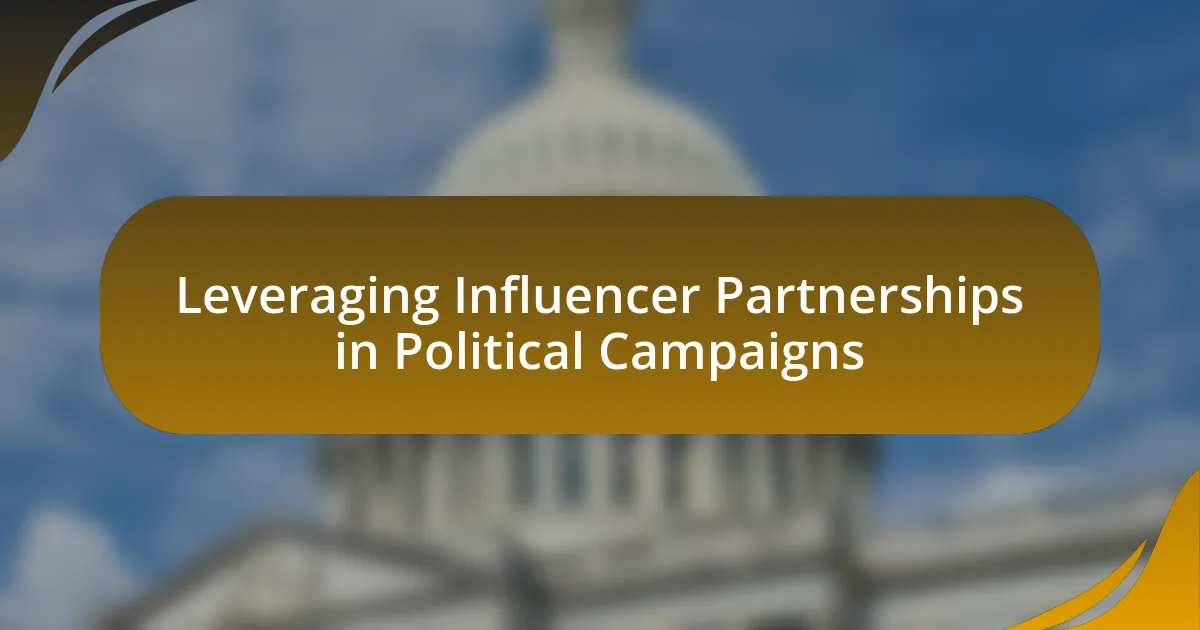Influencer partnerships in political campaigns involve collaborations between political candidates or organizations and social media influencers to effectively promote political messages and engage voters. These partnerships leverage the influencers’ credibility and established audiences to enhance voter outreach, particularly among younger demographics, as evidenced during the 2020 U.S. presidential election. The article explores the functioning of these partnerships, the roles influencers play in shaping political narratives, and the strategies for effective collaboration, while also addressing the challenges and risks associated with influencer marketing in political contexts. Key metrics for measuring the effectiveness of these partnerships and best practices for maintaining authenticity and engagement are also discussed.

What are Influencer Partnerships in Political Campaigns?
Influencer partnerships in political campaigns are collaborations between political candidates or organizations and social media influencers to promote political messages and engage voters. These partnerships leverage the influencers’ established audiences and credibility to reach specific demographics effectively. For instance, during the 2020 U.S. presidential election, candidates utilized influencers to mobilize younger voters, with studies indicating that 50% of Gen Z voters were influenced by social media content in their voting decisions. This strategy enhances voter outreach and can significantly impact campaign visibility and engagement.
How do influencer partnerships function within political campaigns?
Influencer partnerships function within political campaigns by leveraging the social media reach and credibility of influencers to engage and mobilize voters. Political campaigns collaborate with influencers to create authentic content that resonates with specific demographics, thereby enhancing voter outreach and engagement. For instance, during the 2020 U.S. presidential election, candidates utilized influencers to promote key messages and encourage voter registration, resulting in increased participation among younger voters. This strategy is effective because influencers often have established trust with their audiences, making their endorsements more impactful than traditional advertising methods.
What roles do influencers play in shaping political narratives?
Influencers play a crucial role in shaping political narratives by leveraging their platforms to disseminate information, mobilize audiences, and frame issues. They utilize social media to reach large, engaged followings, often presenting political content in relatable formats that resonate with their audience. For instance, during the 2020 U.S. presidential election, influencers significantly impacted voter turnout, with studies indicating that social media campaigns led by influencers increased engagement among younger voters by over 20%. This demonstrates their ability to not only influence opinions but also drive political action, thereby shaping the broader political discourse.
How do influencers engage with their audiences during campaigns?
Influencers engage with their audiences during campaigns primarily through authentic content creation and interactive communication. They create relatable posts, stories, and videos that resonate with their followers, often sharing personal experiences or opinions related to the campaign. This approach fosters a sense of community and trust, encouraging audience participation. For instance, influencers may host live Q&A sessions, polls, or challenges that invite their followers to express their views or share their own content, thereby increasing engagement. Research indicates that campaigns utilizing influencer partnerships can achieve up to 11 times higher return on investment compared to traditional advertising methods, highlighting the effectiveness of this engagement strategy.
Why are influencer partnerships important for political campaigns?
Influencer partnerships are important for political campaigns because they enhance outreach and engagement with target demographics. Influencers possess established trust and credibility with their followers, which can significantly amplify a campaign’s message. For instance, a study by the Pew Research Center found that 70% of young adults trust influencers more than traditional celebrities, making them effective in mobilizing younger voters. Additionally, influencer collaborations can create authentic content that resonates more deeply with audiences, leading to increased voter awareness and participation.
What advantages do influencers provide over traditional campaign methods?
Influencers provide targeted reach and authentic engagement that traditional campaign methods often lack. Unlike traditional advertising, which can be perceived as intrusive, influencers create content that resonates with their audience, fostering trust and relatability. For instance, a study by the Digital Marketing Institute found that 49% of consumers depend on influencer recommendations, highlighting their effectiveness in shaping opinions and driving action. This level of engagement can lead to higher conversion rates compared to conventional advertising, where the average click-through rate is typically lower than 1%.
How do influencer partnerships enhance voter engagement?
Influencer partnerships enhance voter engagement by leveraging the influencers’ established trust and reach within specific communities. These partnerships allow political campaigns to tap into the influencers’ audiences, which can lead to increased awareness and motivation to participate in elections. For instance, a study by the Pew Research Center found that 55% of young voters are influenced by social media personalities when making political decisions. This demonstrates that influencers can effectively mobilize their followers, encouraging them to register to vote and participate in electoral processes.

What strategies can be employed to leverage influencer partnerships effectively?
To leverage influencer partnerships effectively in political campaigns, organizations should focus on aligning their values with those of the influencer, ensuring authenticity in messaging, and utilizing data-driven targeting strategies. Aligning values fosters genuine connections, as seen in the partnership between the 2020 Biden campaign and influencers who shared similar progressive ideals, which helped mobilize younger voters. Authenticity in messaging is crucial; influencers who genuinely support a candidate can convey messages more convincingly, leading to higher engagement rates. Data-driven targeting allows campaigns to identify and engage with specific demographics that resonate with the influencer’s audience, enhancing the overall impact of the partnership.
How can political campaigns identify the right influencers?
Political campaigns can identify the right influencers by analyzing their audience demographics, engagement rates, and alignment with campaign values. Campaigns should utilize social media analytics tools to assess the reach and influence of potential partners, ensuring that the influencers’ followers match the target voter base. For instance, a study by the Pew Research Center indicates that 72% of adults use social media, making it a vital platform for identifying influencers who can effectively engage specific demographics. Additionally, campaigns can evaluate past collaborations and the influencers’ authenticity to ensure they resonate with voters, thereby maximizing the impact of their messaging.
What criteria should be used to evaluate potential influencers?
To evaluate potential influencers, key criteria include audience engagement, relevance to the campaign, authenticity, and reach. Audience engagement measures how actively followers interact with the influencer’s content, indicating their influence and connection with the audience. Relevance assesses how closely the influencer’s values and content align with the campaign’s message, ensuring a cohesive partnership. Authenticity refers to the influencer’s credibility and trustworthiness, which can significantly impact their effectiveness in conveying political messages. Reach quantifies the size of the influencer’s audience, providing insight into the potential visibility of the campaign. These criteria are essential for selecting influencers who can effectively amplify political messages and resonate with target demographics.
How can campaigns assess an influencer’s audience alignment?
Campaigns can assess an influencer’s audience alignment by analyzing demographic data, engagement metrics, and audience interests. Demographic data includes age, gender, location, and interests of the influencer’s followers, which can be obtained through analytics tools like Instagram Insights or Twitter Analytics. Engagement metrics, such as likes, shares, and comments, indicate how well the influencer’s audience interacts with their content, providing insight into audience loyalty and relevance. Additionally, audience interests can be evaluated through surveys or social listening tools that track conversations around specific topics, ensuring that the influencer’s audience aligns with the campaign’s target demographic and messaging. This multi-faceted approach allows campaigns to make informed decisions about influencer partnerships.
What methods can be used to collaborate with influencers?
To collaborate with influencers, political campaigns can utilize methods such as sponsored content, social media takeovers, and event partnerships. Sponsored content involves paying influencers to create posts that promote the campaign’s message, which can reach their established audience effectively. Social media takeovers allow influencers to manage the campaign’s social media accounts for a day, providing authentic engagement and a fresh perspective. Event partnerships involve influencers participating in campaign events, which can enhance visibility and credibility. These methods have been shown to increase engagement and reach, as evidenced by studies indicating that influencer marketing can yield an average return on investment of $5.78 for every dollar spent.
How can campaigns create compelling content with influencers?
Campaigns can create compelling content with influencers by aligning their messaging with the influencer’s authentic voice and audience interests. This alignment ensures that the content resonates with the influencer’s followers, enhancing engagement and credibility. For instance, a study by the Digital Marketing Institute found that 49% of consumers depend on influencer recommendations, highlighting the effectiveness of authentic partnerships. By collaborating on content that reflects shared values and goals, campaigns can leverage the influencer’s reach to amplify their message and foster a deeper connection with potential voters.
What are the best practices for maintaining influencer relationships?
The best practices for maintaining influencer relationships include consistent communication, mutual respect, and providing value to the influencer. Consistent communication ensures that both parties are aligned on goals and expectations, fostering a strong partnership. Mutual respect involves recognizing the influencer’s expertise and creative freedom, which can lead to more authentic content. Providing value, such as exclusive access to events or insights, enhances the relationship and encourages influencers to remain engaged. Research indicates that 70% of marketers believe that building strong relationships with influencers leads to better campaign outcomes, highlighting the importance of these practices in successful influencer partnerships.

What challenges do political campaigns face when leveraging influencer partnerships?
Political campaigns face several challenges when leveraging influencer partnerships, primarily including authenticity concerns, audience alignment, and regulatory compliance. Authenticity issues arise when influencers may not genuinely support the campaign, leading to skepticism among their followers. Audience alignment is crucial, as mismatched demographics between the influencer’s followers and the campaign’s target voters can dilute the message’s effectiveness. Additionally, regulatory compliance poses a challenge, as campaigns must navigate complex laws regarding political advertising and disclosure requirements, which can vary by jurisdiction. These factors can hinder the overall impact and success of influencer partnerships in political campaigns.
What potential risks are associated with influencer partnerships?
Potential risks associated with influencer partnerships include reputational damage, lack of authenticity, and regulatory compliance issues. Reputational damage can occur if an influencer engages in controversial behavior or makes statements that conflict with the campaign’s values, leading to public backlash. Lack of authenticity arises when influencers promote messages that do not align with their personal brand, resulting in distrust among their followers. Regulatory compliance issues may arise from failing to disclose paid partnerships, which can lead to legal repercussions and damage to the campaign’s credibility. According to a 2021 study by the Federal Trade Commission, 90% of consumers expect influencers to disclose their partnerships, highlighting the importance of transparency in these collaborations.
How can campaigns mitigate the risk of influencer controversies?
Campaigns can mitigate the risk of influencer controversies by conducting thorough vetting of influencers before partnerships. This involves researching their past behavior, public statements, and affiliations to ensure alignment with the campaign’s values. For instance, a study by the Pew Research Center indicates that 70% of consumers are influenced by an influencer’s authenticity, making it crucial for campaigns to select individuals who resonate positively with their target audience. Additionally, establishing clear guidelines and expectations for influencer conduct can help prevent potential controversies. By implementing these strategies, campaigns can safeguard their reputation and maintain public trust.
What strategies can be implemented to handle negative feedback?
To handle negative feedback effectively, political campaigns should implement strategies such as active listening, prompt response, and constructive engagement. Active listening involves acknowledging the feedback and understanding the concerns raised, which can help in addressing the issues directly. Prompt response ensures that the feedback is not ignored, demonstrating that the campaign values public opinion. Constructive engagement includes responding with empathy and providing solutions or clarifications, which can help to rebuild trust and improve the campaign’s image. Research indicates that campaigns that engage positively with feedback can enhance voter perception and loyalty, as seen in studies analyzing public relations strategies in political contexts.
How can campaigns measure the effectiveness of influencer partnerships?
Campaigns can measure the effectiveness of influencer partnerships through metrics such as engagement rates, reach, conversion rates, and sentiment analysis. Engagement rates, which include likes, shares, and comments, provide insight into how well the audience interacts with the content shared by influencers. Reach indicates the total number of unique users who see the content, helping campaigns understand the potential audience size. Conversion rates track the number of users who take a desired action, such as signing up for a newsletter or donating, after interacting with influencer content. Sentiment analysis assesses the overall tone of audience reactions, revealing public perception of the campaign. These metrics collectively offer a comprehensive view of the impact and effectiveness of influencer partnerships in political campaigns.
What metrics should be tracked to evaluate campaign success?
To evaluate campaign success, key metrics include engagement rate, conversion rate, reach, and return on investment (ROI). Engagement rate measures interactions such as likes, shares, and comments relative to total followers, indicating audience interest and involvement. Conversion rate tracks the percentage of users who take a desired action, such as signing up or donating, reflecting the effectiveness of the campaign in driving specific outcomes. Reach quantifies the total number of unique users exposed to the campaign, providing insight into its visibility. ROI assesses the financial return generated from the campaign relative to its costs, offering a clear picture of overall effectiveness. These metrics collectively provide a comprehensive view of campaign performance and impact.
How can data analytics enhance understanding of influencer impact?
Data analytics enhances understanding of influencer impact by providing measurable insights into engagement metrics, audience demographics, and conversion rates. By analyzing data from social media platforms, campaigns can quantify how influencer content resonates with target audiences, revealing which influencers drive the most significant interactions and actions. For instance, a study by Nielsen found that influencer marketing can yield an 11 times higher return on investment compared to traditional advertising, demonstrating the effectiveness of data-driven strategies in evaluating influencer performance. This analytical approach allows political campaigns to optimize their influencer partnerships, ensuring resources are allocated to the most impactful collaborations.
What are the best practices for leveraging influencer partnerships in political campaigns?
The best practices for leveraging influencer partnerships in political campaigns include selecting influencers whose values align with the campaign, ensuring authenticity in messaging, and utilizing data analytics to measure impact. Aligning with influencers who share similar values enhances credibility and resonates with target audiences, as seen in the 2020 U.S. presidential campaign where endorsements from relatable figures significantly influenced voter engagement. Authentic messaging fosters trust; for instance, influencers who genuinely support a candidate can create more compelling narratives. Additionally, employing data analytics allows campaigns to track engagement metrics and adjust strategies in real-time, optimizing outreach effectiveness.
How can campaigns ensure authenticity in influencer collaborations?
Campaigns can ensure authenticity in influencer collaborations by selecting influencers whose values align closely with the campaign’s message and target audience. This alignment fosters genuine connections, as influencers who resonate with the campaign’s goals are more likely to communicate authentically. Research indicates that 70% of consumers trust influencers more than traditional advertisements, highlighting the importance of authenticity in influencer marketing. Additionally, campaigns should encourage influencers to share personal stories and experiences related to the campaign, which enhances relatability and credibility. By prioritizing these strategies, campaigns can create more impactful and authentic influencer partnerships.
What tips can enhance the overall effectiveness of influencer partnerships?
To enhance the overall effectiveness of influencer partnerships in political campaigns, it is crucial to select influencers whose values align with the campaign’s message. This alignment ensures authenticity, which is vital for audience trust and engagement. Research indicates that 92% of consumers trust recommendations from individuals over brands, highlighting the importance of genuine connections between influencers and their followers. Additionally, establishing clear communication and expectations with influencers can lead to more cohesive and impactful messaging. Regularly analyzing campaign performance metrics allows for adjustments that optimize engagement and reach, further solidifying the partnership’s effectiveness.
